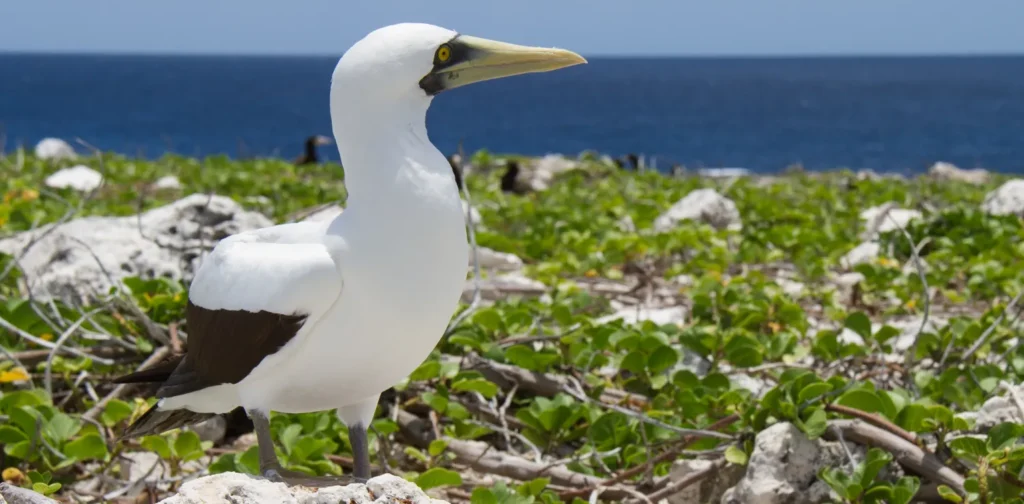Rewilding Sombrero Island from the Brink of Ecological Collapse

Masked Booby Seabird on Sombrero Island
We are in the middle of a biodiversity crisis. Animals, plants, and other species are fighting for their continued survival against climate change and environmental degradation caused by human activities. As the thriving coexistence between humans, biodiversity, and ecosystems is key to a healthy planet, conservation and restoration efforts are underway worldwide. In the Caribbean, local and international actors have been working together to bring Sombrero Island back from the brink of complete ecological collapse.
Biodiversity Hotspot, Threatened
The Caribbean is in the top three of Earth’s biodiversity hotspots, with over 10,000 endemic species. Tragically, the region has accounted for 10% of bird extinctions, 36% of mammal extinctions, and over 65% of reptile extinctions since the 1600s.
Sombrero Island is a tiny, uninhabited 38-hectare of rocky area in Anguilla. It is home to several endangered species that do not exist anywhere else, such as the Sombrero ground lizard, dwarf gecko, bee, and wind scorpion. Sombrero Island is also an important breeding site for various seabird species, including the globally significant brown booby and bridled tern.
What happened? In the 1800s, the British and Americans exploited Sombrero Island for its guano, seabird excrement rich in phosphate and used for fertilizer. By 1890, they had exhausted the guano reserve due to extensive mining. Besides thorough deforestation and ecosystem degradation, the mining operation also brought an invasive species to the island: mice.
Additionally, Sombrero’s biodiversity faces threats from climate change. Dr Jenny Daltry, Caribbean Alliance Director, said, “The Caribbean has contributed little to the global causes of climate change but it is already suffering from its effects. Extreme weather events are becoming increasingly severe, with the past five years seeing some of the worst hurricanes ever recorded.”
While native species may cope with the storms and hurricanes, mice upset the ecological balance. These invasive species eat native reptiles, insects, and seabird eggs as well as seeds and roots of plants that should grow into their habitats. These intersecting factors have brought Sombrero Island to the brink of complete ecological collapse.
Sombrero Island Restoration Efforts
In 2021, a conservation project led by local Anguillan conservationists (Anguilla National Trust) and a Caribbean Alliance (from Fauna & Flora and Re:wild) began. To start, they focused on eradicating invasive mice and finally declared the island pest-free the following year.
Without mice, native species have the chance to rebound. For instance, the Sombrero ground lizard population rose from 100 to more than 1,600 in December 2024.
However, the threat of more frequent and extreme hurricanes and storms remains. To improve climate resilience, conservationists aim to help the recovery of Sombrero’s natural vegetation by planting native plant species. So far, native plants such as sea bean, prickly pear, and spider lily are showing healthy new growth.
“These restoration interventions have cascading effects: they attract insects which help pollinate plants, they attract birds that drop seeds, they provide food and shelter for lizards that also serve as seed dispersers, pollinators, and nutrient transporters,” said Farah Mukhida, Anguilla National Trust Executive Director.
The efforts do not stop here. The conservation team promises to maintain constant vigilance in case of more invasive species. They also plan to continue the rewilding efforts by planting more vegetation and building soil reserves.
“We’re committed to Sombrero’s recovery, sharing lessons learned, and building on successes,” said Mukhida.

Co-create positive impact for people and the planet.
Amidst today’s increasingly complex global challenges, equipping yourself, team, and communities with interdisciplinary and cross-sectoral insights on sustainability-related issues and sustainable development is no longer optional — it is a strategic necessity to stay ahead and stay relevant.

Nazalea Kusuma
Naz is the Manager of International Digital Publications at Green Network Asia. She is an experienced and passionate writer, editor, proofreader, translator, and creative designer with over a decade of portfolio. Her history of living in multiple areas across Southeast Asia and studying Urban and Regional Planning exposed her to diverse peoples and cultures, enriching her perspectives and sharpening her intersectionality mindset in her storytelling and advocacy on sustainability-related issues and sustainable development.


 Reframing Governance in the Era of Water Bankruptcy
Reframing Governance in the Era of Water Bankruptcy  Strengthening Resilience amid Growing Dependence on Space Infrastructure
Strengthening Resilience amid Growing Dependence on Space Infrastructure  Indian Gig Workers Push Back Against 10-Minute Delivery Service Strain
Indian Gig Workers Push Back Against 10-Minute Delivery Service Strain  Call for Governance: Grassroots Initiatives Look to Scale Efforts to Conserve Depleting Groundwater
Call for Governance: Grassroots Initiatives Look to Scale Efforts to Conserve Depleting Groundwater  Integrating Environment, Climate Change, and Sustainability Issues into Education Systems
Integrating Environment, Climate Change, and Sustainability Issues into Education Systems  Finally Enforced: Understanding the UN High Seas Treaty
Finally Enforced: Understanding the UN High Seas Treaty